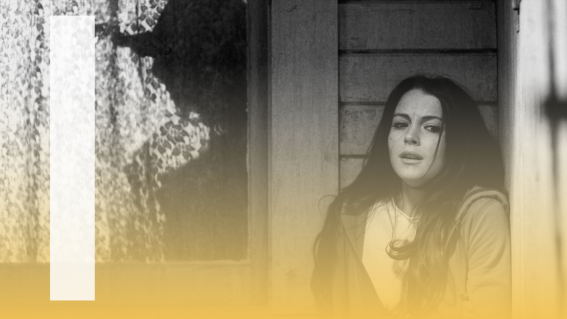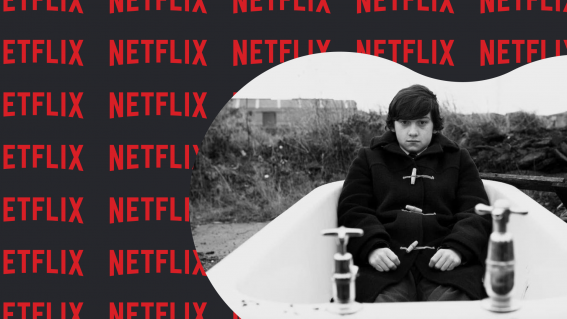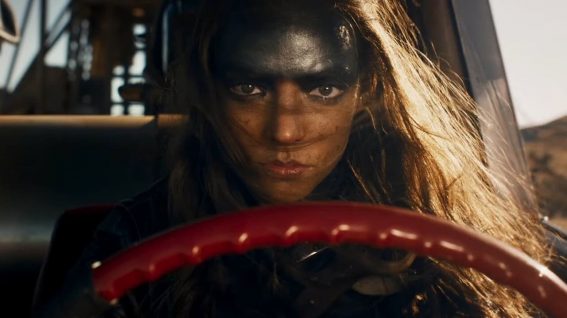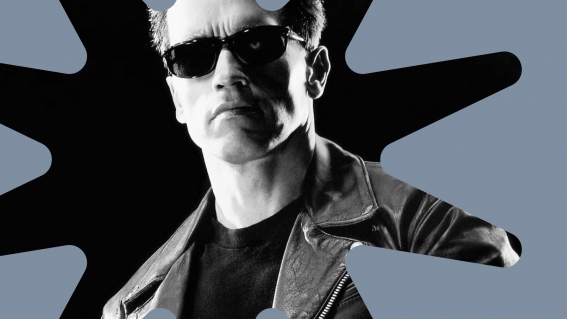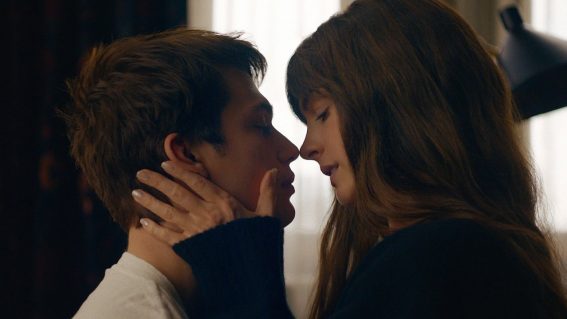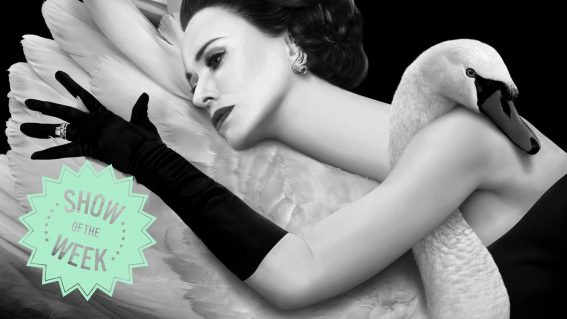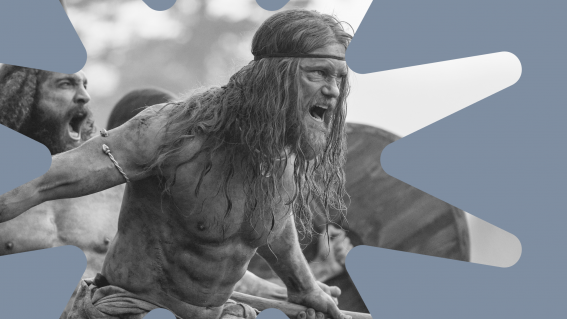Our daily journal from the 66th BFI London Film Festival
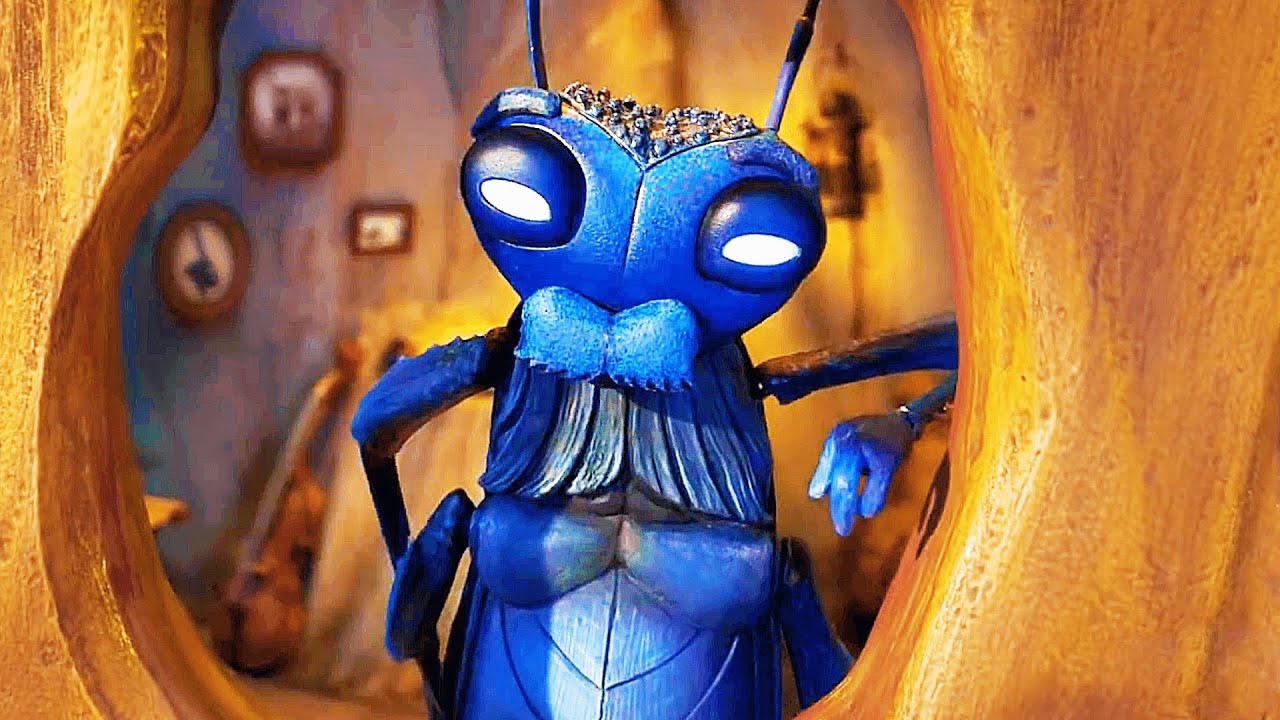
Lillian Crawford, Rory Doherty, Fatima Sheriff and Katie Smith-Wong chronicle their experiences at the 66th BFI London Film Festival.
With over 160 feature films playing over twelve days from October 5 to 16, this year’s BFI London Film Festival is as stacked with viewing as you’d expect (including 23 world, 6 international and 15 European premieres). Galas this year include Opening Night selection Matilda: The Musical while Rian Johnson’s Glass Onion: A Knives Out Mystery closes the fest.
Sandwiched in between are hugely anticipated pics like Bones and All, Bros, Empire of Light, The Banshees of Inisherin, BARDO, False Chronicle of a Handful of Truths, Decision to Leave, Guillermo del Toro’s Pinocchio, She Said, The Whale, White Noise and plenty, plenty more.
What a time to be a film fan in London! And elsewhere in the UK, too, with a selection of films available on the BFI Player and partner cinemas in Belfast, Birmingham, Bristol, Cardiff, Edinburgh, Glasgow, Manchester, Newcastle upon Tyne, Nottingham and Sheffield.
Even if you’re not able to see any of the enormous, diverse programme (which you can check out right here via the LFF official website), our fest news snippets and intel from on the ground will help cut through the noise—and no doubt put a ton of films on your watchlist.
Sunday 16th October – Lillian Crawford
The final weekend began with Guillermo del Toro’s Pinocchio, the director’s keenly anticipated stop-motion adaptation. The film translates the story to inter-war Fascist Italy, swapping out Pleasure Island for a youth military camp, and restoring a disturbing darkness to the plot. Alexandre Desplat decorates the film with another gorgeous score, replete with a programme of exceptional songs, and the production design has clearly been constructed with the greatest love and care. I can’t imagine there being a dry eye by the time the credits rolled, accompanied by the divine voice of Ewan McGregor’s Sebastian J. Cricket.
Sadly, the festival came to an end on Sunday with a whimper. Rian Johnson’s Knives Out sequel Glass Onion is exceptionally dire, as utterly unfunny as the first film, and about as empty as the title object. The forced satire on contemporary America never fails to feel self-satisfied, feeling much like the equally dire ‘message’ films of Adam McKay with a weak murder-mystery plot stapled on. That being said, Janelle Monae and Jessica Henwick are innocent amongst her scenery-chewing co-stars, and there’s a smattering of cameos that managed to elicit a smile. But beyond that Johnson’s attempts to make meaningful social critique are completely spineless.
Sunday 16th October – Fatima Sheriff
Started off with Guillermo del Toro’s Pinocchio, which was utterly charming. Definitely darker and more stylistic than a Disney adaptation, but perhaps, even with Italian fascists and a feature of Mussolini, still not as dark as it could have been for Del Toro’s oeuvre. But, it was gorgeous, especially the scenes featuring Tilda Swinton’s sphinx-like characters, and Ewan McGregor is the perfect narrator as the cricket. It was, surprisingly, a musical, but not overwhelmingly so, the numbers fit nicely into the plot without outstaying their welcome and Gregory Mann is pitch perfect to pull off the child-like wonder of Pinocchio.
Sunday brought the slightly polarising Glass Onion, in which Rian Johnson expands his canon of Benoit Blanc adventures with a glorious cast – Kate Hudson is having the time of her life (not unlike her role in Mona Lisa and the Blood Moon which you should also check out). The second act is a little overlong in its reveals, but otherwise, the cameos delight and the humour is just as silly as the first. Then, not part of the festival but I went to see Mrs Harris Goes to Paris with fellow critic Rose Dymock. It swept me off my feat with its dedication to portraying a love of fashion, and Leslie Manville carries the film beautifully with her no-nonsense, socialist gatecrashing into the world of snooty high fashion.
Sunday 16th October – Rory Doherty
The end has arrived! 32 films later, the London Film Festival draws to a close. What better way to send us off than Rian Johnson’s Knives Out sequel Glass Onion, another irreverent, twistily composed sweet treat, which might be the most fun any Bond has had in the film they followed up their final outing in. I’m of the opinion the satire in Knives Out was never its strongest asset, but at least Johnson is much surer in his footing with meticulously crafted, constantly out-witting mysteries.
“What a note to end things on!” is what I would be saying if I hadn’t gone to see a French documentary about surgery immediately afterwards. My real final film of LFF was De Humani Corporis Fabrica, a film made up of disconcerting and hypnotic footage filmed in French hospitals: of staff, patients, and the insides of bodies. It’s a sensorially overpowering time, but strangely beautiful and powerful—and above all else, very human.
Saturday 15th October – Rory Doherty
My penultimate screening for this year’s LFF, and a hotly anticipated film—Guillermo Del Toro’s impassioned and finely crafted stop-motion version of Pinocchio. It’s a story that threatens to be DOA thanks to its exhaustive over-adapted present state, but trust a visionary like Del Toro to find a fresh new angle. (Set in fascist Italy? Sure!) I’ve always forgiven Del Toro’s slightly baggy and clumsy writing thanks to the persistent rush of joy I get from the deeply affectionate, subversive stories he tells, and Pinocchio was much the same. It’s gorgeous, it’s affecting, and if you find it overlong, it’s tough to argue anyone working today cares more about the fantastical and weird like Del Toro.
Friday 14th October – Rory Doherty
Another one-film morning, as I’m celebrating an anniversary today! I caught She Said, the latest newspaper story about the New York Times journalists who broke the sexual assault allegations against Harvey Weinstein in 2017. Director Maria Schrader (Unorthodox) handles everything with an admirable delicacy, and Zoe Kazan and Jennifer Ehle are particular stand-outs, but for me, there’s a hard ceiling on how much I can enjoy a subgenre of films that feel endlessly narratively derivative of each other, regardless of how revolutionary or important the journalism depicted was. Articles can be so much more compelling than movies, it turns out.
Thursday 13th October – Lillian Crawford
We now get into the final days of the festival, with only one press screening a day. I made it into Leicester Square this morning for Martin McDonagh’s latest, The Banshees of Inisherin. Contrary to the title, there are thankfully no actual banshees in the film, it being the title of a folk tune Brendan Gleeson’s fiddle-player has been working on when he decides to terminate his friendship with the awfully-nice-but-dim character played by Colin Farrell. It’s McDonagh’s tamest and least controversial work, albeit with plenty of darkness underneath, featuring a menagerie of beautiful animals led by a donkey called Jenny.
Today I was incredibly excited to attend a Screen Talk with Mia Hansen-Løve, whose Un Beau Matin (One Fine Morning) is my favourite film of the festival. As a fan of many years, I was hanging on every word she said, revealing personal insight about each of her films within the 90-minute Q&A. Floating on the delight of seeing her in person, I then hung around the Royal Festival Hall into the evening for one of the festival’s most-anticipated events: the surprise film. This year it was Mark Mylod’s The Menu, a film I had been looking forward to out of sheer thirst for Anya Taylor-Joy and Ralph Fiennes. It’s probably dreadful, but the eroticism of the leads and a giant hall filled with people having a great time was enough to carry it through.
Thursday 13th October – Rory Doherty
Just one film today, as I am officially in my winding-down phase of the festival. I had a chill day of work and socialising, concluded with the much-anticipated surprise film, which after much speculation and some frenzied private jet tracking, turned out to be the most likely film—The Menu! Lots of lovely British stars and the most prolific director of Succession made this culinary arts satire thriller a light, spritely treat that went down smooth, but if we’re stretching metaphors, it was the one that leaves you with no hunger abated and a slight sour taste in your mouth. Let’s just say the ephemeral nature of the film’s ostensibly cutting satire made a lot more sense when the “Produced by Adam McKay” credit appeared at the end.
Wednesday October 12 – Lillian Crawford
The tiredness was kicking in once again in the middle of week, with screenings left largely empty. This was the case for the first picture of the day, and my most-anticipated film of the year. Mia Hansen-Løve has long been my favourite director, the filmmaker most capable of crafting characters and stories that resonate with me directly. After last year’s anglophone and non-linear Bergman Island, it’s refreshing that she has returned to her quiet realism for Un Beau Matin (One Fine Morning). Surprisingly she hasn’t worked with Léa Seydoux before, and she fits Hansen-Løve’s style beautifully. Tackling affairs, motherhood, and growing old, the film tackles major emotional subjects in the way they often all come into our lives at once, creating a layered impression of life as it is lived.
Today’s programme really was a specially curated treat for me, following Hansen-Løve with my other great artistic love, ballet. When the schedule for the festival was announced, it was Creature which first caught my eye – a collaboration between documentary filmmaker Asif Kapadia and choreographer Akram Khan. Produced by and featuring the English National Ballet, the film is an original work by Khan which includes the camera in the choreography in a way that breaks down the walls of staging typical of traditional ballet and recorded performance. The result is completely overwhelming, realising what Powell and Pressburger did in the ballet scene of The Red Shoes as a feature-length production. The result is breath-taking.
Wednesday October 12 – Fatima Sheriff
Just saw Banshees of Inisherin today, but what a winner. Made me cry laughing, and then made me cry a bit as well. Colin Farrell may be all eyebrows but he’s utterly charming and Brendan Gleeson pulls off playing a very difficult character. My favourite Martin McDonagh (because I’ve only seen Three Billboards and I hated that it won Best British film over Paddington 2).
Good animal count: 2+, mainly a gorgeous collie and a donkey named Jenny.
Wednesday October 12 – Rory Doherty
A lot of the chatter at the moment is still on Darren Aronofsky’s The Whale, the operatic drama starring Brendan Fraser on the comeback trail, starring as an obese man suffering from binge eating disorder who struggles to reconnect and make amends with those who see him as a target of pity and vitriol. Last night’s gala screening was reportedly electric, with a rapturous standing ovation for Brendan Fraser that Aronofsky today remarked was a highlight of Brendan’s whole festival tour. I have not stopped hearing about how much people cried at this film, it’ll certainly be the most memorable of the big screenings.
The same certainly cannot be said for Sam Mendes’ Empire of Light, considerably low-stakes fare from the Bond and 1917 director, about a cinema in seaside Hastings and the troubles of its workers. The bits with the bubbly, low-paid employees (£4.50 for a whole day’s work!!) are undeniably winning, as is Roger Deakin’s usual eye for beautiful shots, but the film suffers from a confused story, muddying its identity and never giving its many themes and storylines any real development. No more love-letters to cinema!
Tuesday October 11 – Lillian Crawford
We’re drawing towards the end of the main press screenings now, and after the rush of the weekend there seem to be less people at the Picturehouse. This was not the case for Tuesday morning’s screening of Darren Aronofsky’s The Whale, a film which seems to have split critics into two firm camps since its Venice premiere. I found myself torn between the two of them – there’s a lot to loathe here, especially its portrayal of eating disorder in terms of framing, mise en scène, and sensationalism. Brandon Fraser was held up as a physical spectacle, something to be gawked as an extreme in the tradition of heavy prosthetics and fats suits leading to Oscar success. That being said, there was a lot in the dialogue which moved me and, while sometimes heavy-handed, the more nuanced passages about grief, depression, and especially religion made it a difficult film to write off.
The tonal whiplash which film festivals often bring has seldom been more keenly felt than leaving The Whale to see queer romantic comedy Bros. It’s a film I gave no intellectual time to, but had a wonderful time in the screening, laughing so hard I cried, while certainly acknowledging the criticisms levied against it.
There was more sensitivity to my third film of the day, an adaptation of Bethan Roberts’s novel My Policeman starring Harry Styles, Emma Corrin, and David Dawson. While Styles’s delivery wavers been passable and laugh-inducingly awful, Corrin and especially Dawson flesh out their characters beautifully. The weaving between the 1950s and 1990s was deftly handled, and the whole thing looked and sounded gorgeous. Very much the mood refresh I needed after the extremes of the last two features of the day.
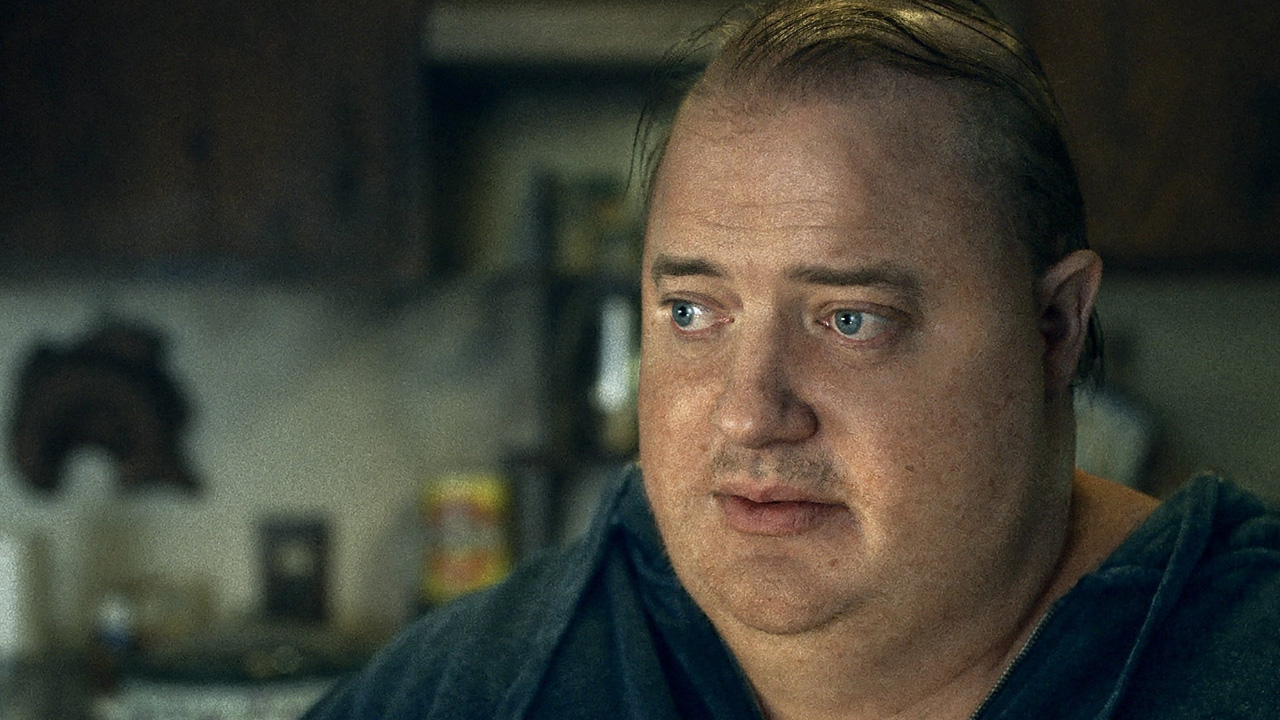
The Whale
Tuesday October 11 – Rory Doherty
I was firing on all cylinders and watched four films of varied quality, starting with Martin McDonagh’s Banshees of Inisherin – a film that feels both tighter and more relaxed than McDonagh’s other features. I love the Irish playwright’s work, even though In Bruges feels like the only script he’s penned that doesn’t have a certain messiness to it, and Banshees was a welcome return to acerbic, melancholy roots – his first film set in Ireland! Looking forward to having its deeper meanings roll around my brain later on.
If I can’t connect with a film, but I know there’s a lot I’m missing, I’ll often rewatch it within 24 hours to give it another go – and I’m over the moon I did that with Saint Omer, which seemed not only much more accessible but more resonant on a second viewing. The last forty minutes, including one of the most moving and powerful closing arguments ever in film, feel like a tiny empathetic miracle. I recommend a recent rewatch for all films that leave you cold!
A double-bill of genre fare closed off the evening, with the Thief-esque Aubrey Plaza crime pic Emily the Criminal and the Norwegian sleep paralysis horror The Nightmare. Emily the Criminal’s influences weave directly into its story, updating the labour-conscious criminal characters Michael Mann penned so brilliantly, whereas The Nightmare’s derivations of Rosemary’s Baby, John Carpenter and Dario Argento, as well as some inept script work and directing, sunk the whole affair. Only a few days more of films, and then we rest. Yes… we shall rest.
Tuesday October 11 – Katie Smith-Wong
I think today is the strongest day of the festival so far with three solid films all focused on LGBTQ+ characters. The first is the critically acclaimed The Whale, starring Brendan Fraser in a welcome return to the big screen. Directed by Darren Aronofsky, The Whale sees Fraser star as an obese, reclusive teacher who tries to make amends with his estranged teenage daughter Elli (Stranger Things‘ Sadie Sink).
Although the film primarily takes place in Charlie’s apartment, it confines the drama and retains the film’s focus on Charlie—especially when all the supporting characters, ranging from carer Liz (Downsizing‘s Hong Chau) and missionary Thomas (Ty Simpkins) try and reach out to him. The Whale has an array of solid emotive performances and Fraser is beyond brilliant, unafraid to express his emotions and control his physicality to convey Charlie’s internal and external struggles—needless to say, it will be a surprise (and a crying shame) if he is not among the Best Actor nominees in the 2022-2023 awards season.
The second film of the year is Bros, a gay romantic-comedy co-written and starring Billy Eichner as a podcaster who embarks on a relationship with Aaron (Luke Macfarlane), an attractive lawyer. The hilarious screenplay delivers a continuous stream of jokes in this refreshing rom-com and it becomes endearing without it becoming saccharine. Combined with Eichner and Macfarlane’s cute chemistry, it is definitely one of the most entertaining films of the festival so far.
The last film of today is My Policeman, directed by Michael Grandage and starring Harry Styles, Emma Corrin and David Dawson. The film is set in 1950s Brighton, where policeman Tom (Styles) and museum curator Patrick (Dawson) have a secret relationship although Tom dates and later marries schoolteacher Marion (Corrin). As the film fluctuates between the 1950s and the 1990s, there is little time to fully develop the characters and the emotional turmoil they have with their shared secret—especially given the social constraints in the 1950s towards gay people. The resulting unexplained plot holes and half-baked narrative cause My Policeman towards predictability, leaving Styles’ performance open to criticism and Corrin in the background. Although Styles does deliver a solid performance, it comes across as bland in comparison to Dawson’s complex performance as Patrick.
Monday October 10 – Fatima Sheriff
Radio silence yesterday as tragedy struck (train strikes) and I couldn’t get to Living after all of my preparation! Thankfully I was around for Women Talking which safe to say, was incredible. Ben Whishaw quoting Romantic poets is Fatima-core content right there but seriously the ensemble were heartbreakingly good.
The next day fared much better, Origin of Evil was a lot of fun, French “be gay do crime” thriller about a woman infiltrating a rich household led by a domineering patriarch. Decision to Leave was a Park Chan Wook that was more my speed than his more shocking Oldboy and Handmaiden, a gentle but transfixing love story with the smoothest transitions to sweep you off your feet alongside its hero. Last was Saint Omer which was gripping, but the second act of courtroom scenes were a tad too drawn out and I fell asleep so a rewatch is in order but Alice Diop’s mastery still shone.
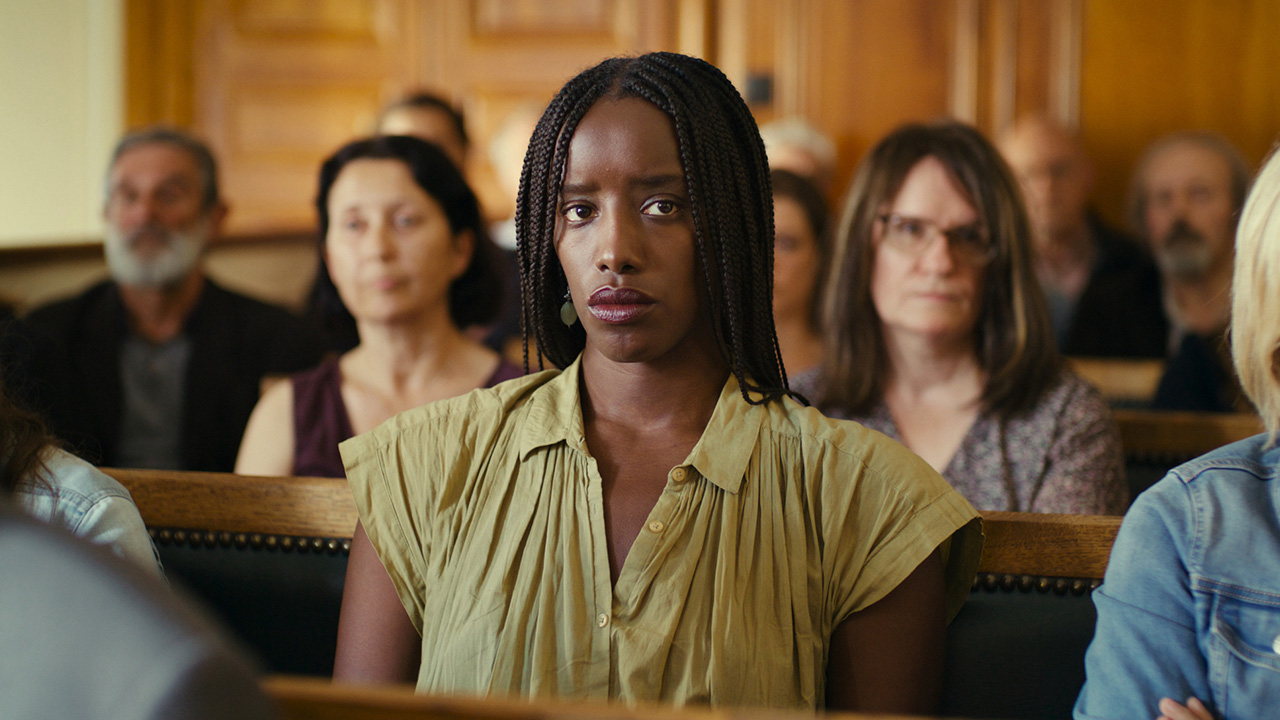
Saint Omer
Monday October 10 – Lillian Crawford
I had a very quiet Monday as festival fatigue well and truly kicked in after a busy first week. The only event on my schedule was a Screen Talk with Aubrey Plaza at the Curzon Soho. I am a huge fan of her films and general personality, having seen all her films to a borderline obsessive degree. It was so wonderful to see her being herself and talking about the many characters she has played during her eclectic career so far. Plaza is in town for the UK release of Emily the Criminal, a brilliant thriller about a young woman who turns to crime to pay off her student debts. The film is screening at the festival and I highly recommend seeing it, not least for a very different performance from Plaza’s iconic brand of deadpan comedy.
Monday October 10 – Rory Doherty
Monday offered a triple bill of films I found really inaccessible, in starkly different ways. I spent most of The Good Nurse wondering if the endgame for international directors and promising screenwriters will just be to produce increasingly middling and flattened true crime fare for streaming services.
Saint Omer, the narrative debut of acclaimed French-Senegalese documentarian Alice Diop, by contrast takes a startling unique lens to the courtroom drama, rich with powerful subtext—but stylistically it was too off-putting to this burnt-out critic and little of it connected with me.
I concluded the evening with The Son, the mental health family drama from The Father’s Florian Zeller, which I thought was just awful. As someone who’s written extensively about mental health stories in film, this felt like something from 20+ years ago. My planned fourth screening got ditched, and I venture onwards now to bed. At least things look like they’re calming down from here on in…
Sunday October 9 – Lillian Crawford
I took things at a gentler pace, only coming into the festival to see one film: Sarah Polley’s Women Talking. I love her work, especially the documentary Stories We Tell (2012), and was anticipating an experiment in theatricality and dialectics. This is certainly the point of Women Talking: it is a philosophical discourse, played out by some great actresses including Rooney Mara, Claire Foy, and Jessie Buckley, made cinematic by a uniquely melodic score from Hildur Guðnadóttir and stunning Malickian cinematography. But the experiment is largely left to breathe, focusing on words which feel like improvisations, an echo from a past style of filmmaking which dared to put ideas before entertainment. I shall certainly be revisiting and ruminating on this one for a while.
Sunday October 9 – Rory Doherty
Today I saw Living, the British Bill Nighy-starring remake of Akira Kurosawa’s Ikiru about a terminally ill bureaucrat. It’s gorgeously shot, with wonderful performances and sharp writing, but it lacked both the emotional wallop and incisive social criticism of the original.
Sarah Polley’s Women Talking was a quiet triumph, going head-on with gender politics intersected with religious trauma in a very talky but perfectly rhythmed rumination on how victims can sever their links to abusive, violent men when they’re bounded by marriage and blood. It works where dozens of other muted, theatre-inspired films just don’t.
Saturday October 8 – Fatima Sheriff
I watched Ikiru on BFI Player, Takashi Shimura you have my heart. I’m now ready to review Living tomorrow—I adore Bill Nighy (I even suffered through Wild Target for him) and Ishiguro who has written the screenplay is one of my favourite modern novelists. Let’s go!
I can also write about My Father’s Dragon now the embargo has lifted and though it didn’t hit like Wolfwalkers did for me personally, there were moments of beauty that made me gasp with joy like only Cartoon Saloon manages to. The plot meanders in the middle to introduce a lot of animal characters but it made me weep nonetheless, bless you Gaten Matarazzo as Boris the dragon. Lovely, lovely film.
Saturday October 8 – Rory Doherty
I intend to increase the portion of my diary entries dedicated to logistics and travel exponentially—and so I’m glad to report that, even though today is the day I am between AirBNBs during my London stay, I had a painless day of films! Luggage dropped off, I was ready to watch Causeway, a PTSD drama starring Jennifer Lawrence and Brian Tyree Henry. It made a worthy attempt to tackle living with disability, including some surprising reveals late in the game, but I found the material stretched too thin and the drama too slight for the film to really take hold.
It was a similar problem I had with Jeong-sun, a Korean film that looked at the devastating effects of digital sex crimes, especially for older, working-class women. The stripped-back style and compelling performances aided the film’s emotional impact greatly, and yet the moments it felt powerful were too few and far between. It tackles so many nuanced topics relating to Korean gender and labour, but it never graduated from feeling like a 30-minute short film.
The day was saved by the Venice Golden Lion winner All the Beauty and the Bloodshed, Laura Poitras’ outstanding documentary on queer photographer Nan Goldin and her battle against the engineers of the Opioid crisis, the Sackler family. Poitras’ film weaves the photographic past of Goldin with her present-day protests with such delicacy and assured filmmaking, the documentary has you in the palm of its hands within the first half hour. By the 75-minute mark, where the two strands start to directly intersect, you’re entranced by the beauty and hardship that’s defined Goldin’s life throughout, and how powerful her empathic abilities are.
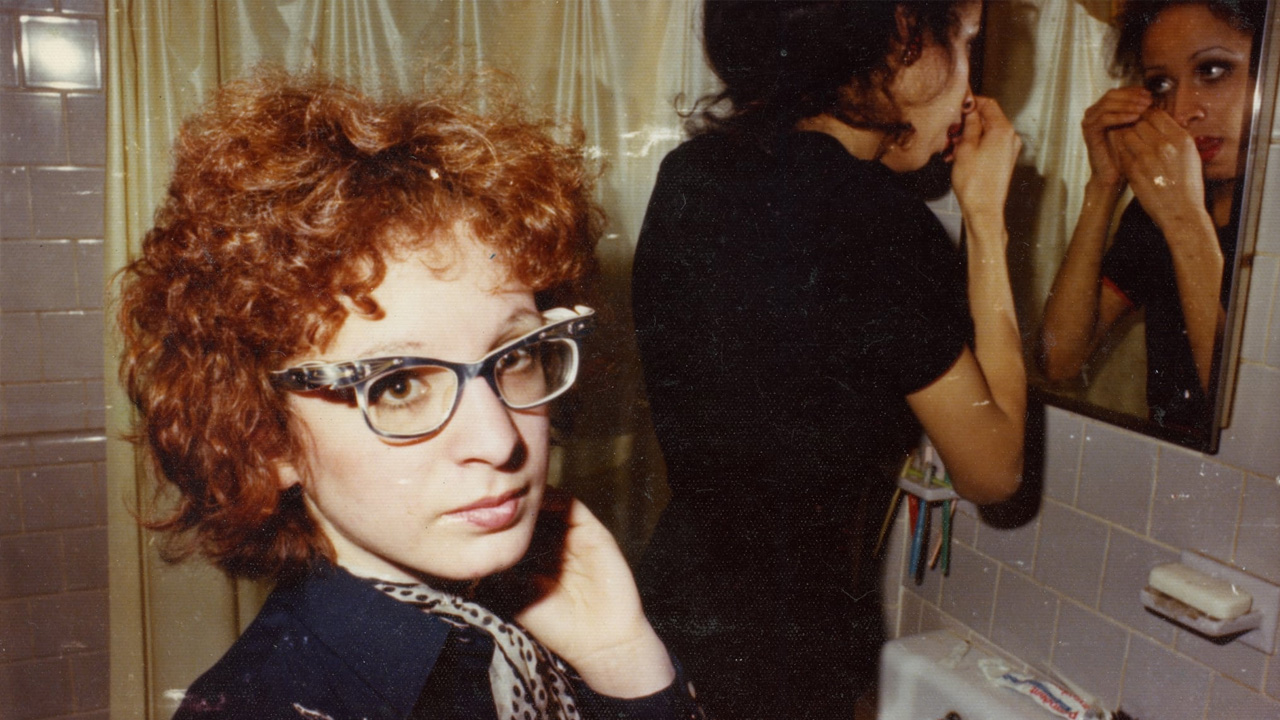
All the Beauty and the Bloodshed
Saturday October 8 – Lillian Crawford
We’ve reached the weekend, and the day screenings have been packed with people. Not so much the case for my first film, the stunning feature debut of Charlotte Wells, Aftersun. Starring Paul Mescal as a dad with depression, the film follows a holiday to Turkey he takes with his 11-year-old daughter while trying to put on a brave face for her. The climax is inevitably devastating, subverting a sweet summery film into something unspeakably tragic. Wells draws from the works of Chantal Akerman, Margaret Tait, and Laura Mulvey, as well as Lynne Ramsay’s Morvern Callar (2002) to create a unique and artistic film which will be sure to haunt me for some time yet.
I spent much of the day writing in the Picturehouse before seeing one of my most anticipated films. The documentary All the Beauty and the Bloodshed directed by Laura Poitras follows photographer and artist Nan Goldin as she tells the incredible story of her life, and her campaign to destroy the Sackler family’s name. The result is a unique blend of artistic creation and activist dismantling, pulling us immediately on side and keeping us with Goldin and her campaign throughout. In many ways, it feels like a filmed retrospective exhibition, while also being a political piece of filmmaking. It was so great to watch the film in a full screening room, eliciting rousing applause as the credits rolled.
Friday October 7 – Katie Smith-Wong
As a huge fan of Florence Pugh, I was looking forward to The Wonder, which was today’s Gala P&I screening. I had been a fan since Lady Macbeth, which was shown only six years ago, but Pugh has always been a consistent performer in each project she has been involved in – even Don’t Worry, Darling!
Needless to say, The Wonder didn’t disappoint. Based on the eponymous book by Room author Emma Donoghue, Chilean director Sebastián DeLillo brings a haunting, beautifully atmospheric adaptation to the big screen. As nurse Elizabeth, Pugh anchors the film with a determined yet compassionate performance. Another notable actress—who is sure to go on to do great things—is Kíla Lord Cassidy, whose delivers a beguilingly innocent performance as Anna.
The second film of the day I wasn’t sure of—Luca Guadagnino’s adaptation of Camille DeAngelis’ Bones and All, which was a late addition to this year’s festival lineup. Starring Taylor Russell and Timothée Chalamet, the story follows two young cannabalistic lovers on a road trip across America.
Although the cannibalism within the narrative may prove too much for audiences, it doesn’t dissuade the tenderness from this unlikely love story that focuses on two lost souls finding their place in the world. Enhanced by Arseni Khachaturan’s cinematography and Guadagnino’s intimate direction, Russell and Chalamet’s sweet chemistry help the story come together, with Michael Stuhlbarg and Mark Rylance offering the odd yet sinister surprise. Overall, it is more unsettling than The Wonder but if you can take the odd sight of blood, it’s a tender, sun-kissed tale.
Friday October 7 – Lillian Crawford
The third day began with Sebastian Lélio’s The Wonder, based on the novel by Emma Donaghue. One might be forgiven for thinking it was much older, akin to the works of Daphne Du Maurier in setting and narrative. There’s an odd framing device about artifice which is introduced but not properly used, failing to make as profound a point as it gives itself credit for. Florence Pugh is perfectly fine in the lead role as a nurse assigned to watch over a girl with a supposedly miraculous ability to survive without food, lending a clarity that the film’s dialogue desperately needed.
The second film was the first major disappointment of the festival, Luca Guadagnino’s cannibal road movie Bones and All. While not quite as abominable as his remake of Suspiria, the film has no direction whatsoever, fails to drive home the gory punch it teases throughout, and features some truly dire performances from Timothée Chalamet and Mark Rylance. At over two hours, it almost has one gnawing one’s own arm off.
The last film of the day was rather more refreshing, an adaptation of Alan Bennett’s play Allelujah. Directed by British theatre stalwart Richard Eyre, the film features an all-star cast from Judi Dench and Julia McKenzie to Derek Jacobi and David Bradley bringing some superbly black light-hearted humour. As is typical of Bennett, not everything is as cosy as it appears, and the hospital setting grows more One Flew Over the Cuckoo’s Nest than Jam & Jerusalem. The ending packs a powerful punch about the NHS, updating the ending to reflect on the pandemic. A decent end to a rather lacklustre day.
Friday October 7 – Rory Doherty
It seems a lot of us are commenting on the difficulties navigating this city from the disparate corners we’re all accommodated in, so it’s good to know the early commutes for screenings isn’t a lone struggle.
I treated myself to a lie-in this morning so I could make it as early as possible to Bones and All, the latest crowd-pleaser from Luca Guadagnino (as crowd-pleasing as a Reagan-era cannibal road-trip can be). What joy! I loved it, although knowing how much DNA it shares with Thirst and Near Dark probably helped (Badlands and American Honey were also banded around as comparisons. It’s gnarly, utterly gorgeous and richly romantic, a coming-of-age film with stomach-turning gore and entrancing style. It wears its Young Adult novel roots without shame, but what’s so compelling about Bones and All are the genuinely troubling, uncomfortable ideas bubbling beneath the surface, ones that the characters nor the YA narrative are adept enough to articulate. It’s this tension between the upsetting and romantic that makes it such a compelling watch. One of those films that feels made specifically for your tastes (I don’t eat people).
I also caught Blue Jean, the British queer drama set in Section 28-era Northern England. The graininess of the film print made its characters feel in equal parts radiant and corrosive, and it’s a thorough interrogation of the way internalised homophobia is internalised and performed, to devastating results. It proves a rewarding watch, and a confident feature debut from writer-director Georgia Oakley—even if its momentum threatens to falter in an overly drawn-out second act. Still, it’s good to see a film give its complicated ideas breathing room.
As a sucker for stories of the corruption of faith and films where Ciarán Hinds turns up for three minutes as a priest, I really dug The Wonder, the new film from Sebastián Lelio. Florence Pugh gave a suitably tremendous performance, but it was the Irish ensemble, including newcomer Kíla Lord Cassidy as a supposed miracle child, who helped sell the turbulent themes of faith guising, or existing, as a con.
Friday October 7 – Fatima Sheriff
A quiet day, I finally got a lie-in after those 6am starts so I’m sure my line-up is different from the others. I watched the remastered version of Queen of Spades (1949) and I wholeheartedly recommend it to those with access to the Digital Viewing Library. Perfect spooky watch based on the Pushkin novella—a cautionary tale against playing faro, a game all the kids are playing these days, that’s how the Rostov chap lost his money too, or so I hear. I’m continuing the classic Russian theme by reading Tolstoy’s The Death of Ivan Ilych, relevant because it is the original original source material for Living starring Bill Nighy which will be screening on Sunday. Hype! I shall bring more word from the Digital front tomorrow…
Thursday October 6 – Lillian Crawford
The early tiredness kicks in with these 8 am screenings, but I certainly wasn’t going to miss Noah Baumbach’s latest feature. White Noise adapts the great postmodern American classic novel by Don DeLillo, a frenzied stream of multiple consciousnesses that blackly mocks the rise of consumerism in the 1980s. Adam Driver is superb as the central Hitler Studies professor, as is Greta Gerwig as his chronically depressed wife Babette. Without doubt the best pandemic movie to date.
For my second screening, I opted for Xalé, a film from Senegal directed by Moussa Sène Absa. This was very much an example of going into a film blind, often my favourite festival experiences, and Xalé certainly did not disappoint. It combines gritty realism with stunning flights of fantasy, using a gospel choir and a mysterious shamanic figure to narrate the story of a young girl being raped by her uncle, and her eventual revenge. Nguissaly Barry gives an astonishing performance as Awa, reminding me in many places of the brilliant Malian film Bamako (2006) with its blend of documentary-style drama and courtroom scenes.
The final film of the day was my favourite of the festival so far, the latest documentary from Sebastien Lifschitz, Casa Susanna. I was delighted to see the small screening full for the film, which examines a house in the Catskills where a group of crossdressers, trans* people, and their spouses would meet in a place of unique acceptance. Two of the women who used to go to the house, and the daughter of one of the crossdressers, reflect with exceptional clarity on the power this environment had. The emotions in the room were palpable, reaffirming to me that Lifschitz is the most empathetic documentarian.
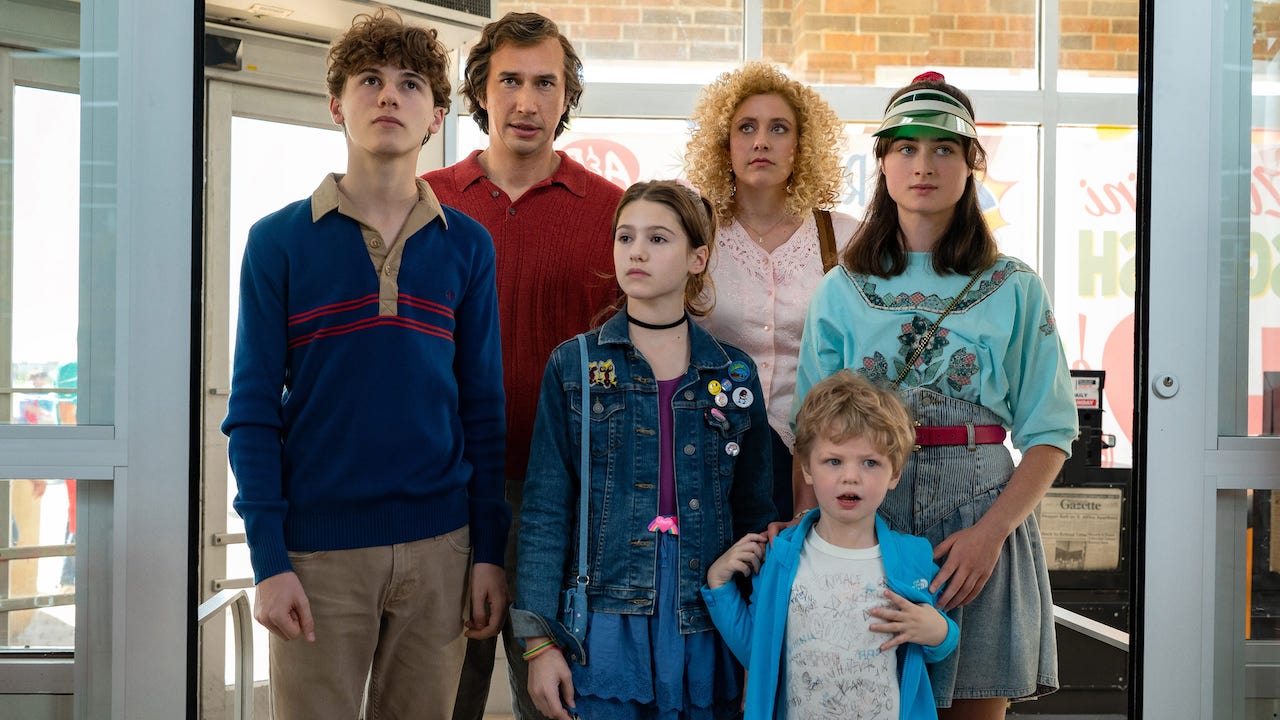
White Noise
Thursday October 6 – Rory Doherty
I slept in today and still got an excellent seat for this morning’s screening of Noah Baumbach’s White Noise, so I intend to reconsider how early a start I am making myself endure. Regardless, White Noise was terrific fun; a blending of Don DeLillo’s signature frenzied, neurotic style with the nasally quirks of Baumbach’s domestic dramas. Most notably, it’s Baumbach’s biggest movie by far, letting him stretch his wings as a filmmaker into genre territory—I can’t believe the world now has a Noah Baumbach action sequence.
It’s very much a film of two halves, and while I had to wait a while in the second half for the themes to really take shape into compelling drama, I’m very happy to forgive the film its indulgences. Good to see a filmmaker use a bloated budget to do stuff no-one else will let them do! Between this, The Northman, and Nope, we love to see filmmakers scaling up in exciting ways.
After a short break was the miniscule-budgeted The Origin, a caveman survival movie set in prehistoric Scottish highlands that bears a lot of similarities to this year’s Predator film Prey, but despite having a fraction of the budget, The Origin has an infinite amount more drama, themes, and characters—and that’s not including the invented language all the characters speak. We get to see evolution in action in an impressively well-crafted film, all the stops are pulled out to give tension, mood, and unapologetic thrills.
Thursday October 6 – Fatima Sheriff
After an incredibly panicked morning rushing from Warren Street to Leicester at 8:20am I made it for White Noise! I hate disaster movies and am generally repelled by dystopian fiction, but I enjoyed it very much so don’t let the premise dissuade you. I’m sure Lillian who read it in preparation has more insight but considering the chaotic premise I imagine it is a difficult novel to adapt but Baumbach’s take is colourful and the cast are charismatic so it is an enjoyable watch.
Wednesday October 5 – Katie Smith-Wong
The first day of LFF and we are kicking things off with the film adaptation of Matilda: The Musical. The excitement for the opening gala is palpable yet it feels like a safe choice to open the festival. However, it is a British production so it is sure to win over families and younger film fans.
Other films being shown today include Joanna Hogg’s follow-up to her two-parter The Souvenir, The Eternal Daughter, and Palm Trees and Power Lines following its premiere at Sundance Film Festival. I chose to catch Violet Du Feng’s melancholic Chinese documentary Hidden Letters, which explores the secretive written language of Nüshu and the longstanding patriarchal views of Chinese society.
Roll on Day 2!
Wednesday October 5 – Lillian Crawford
For this year’s iteration of LFF the absurd queues of the last festival have given way to a token ticketing system, meaning one doesn’t have to arrive two hours ahead of time to guarantee a seat. We’ve also moved from the Leicester Square Vue to Picturehouse Central for much of the screenings, creating a more cohesive venue for delegates to work and socialise in. It certainly made for a more streamlined and less stressful opening day.
I began by foregoing the gala screening of Matilda: The Musical to see Mikhaël Hers’s Berlin-competitor Les passagers de la nuit, a French drama starring Charlotte Gainsbourg as a mother struggling to make ends meet after a separation in the 1980s. She takes a poorly paid job on the switchboard of a nighttime radio show presented by Vanda, played by Emmanuelle Béart, where she meets a young homeless girl called Talulah, played by Noée Abita, who somehow steals the screen from her legendary co-stars. The beautifully tender family drama features stunning 16mm footage, ‘80s nostalgia, and a falling in love with Full Moon in Paris by Éric Rohmer.
Up next was the new film from Joanna Hogg, her first following her two semi-autobiographical The Souvenir films, entitled The Eternal Daughter. It stars Tilda Swinton in a dual role, both as a filmmaker called Julie (presumably an older version of Hogg’s The Souvenir stand-in played by Swinton’s real-life daughter, Honor Swinton-Burne) and her elderly mother. What follows is an eerie British chiller set in a mysterious country house that has been converted into an hotel, reviving a gothic style wholly unique in Hogg’s filmography.
The final film of the first day for me was Marie Kreutzer’s Corsage, starring Vicky Krieps as Empress Elisabeth ‘Sissi’ of Austria. As someone fascinated by the life of Sissi and the Austrian film series directed by Ernst Marischka, this was at the top of my watchlist and it certainly did not disappoint. Making clever use of anachronism in a similar way to Sofia Coppola’s Marie Antoinette, the film becomes a playful and original dissection of the national image of Sissi, revealing a fiercer but more tormented woman than previous portrayals.
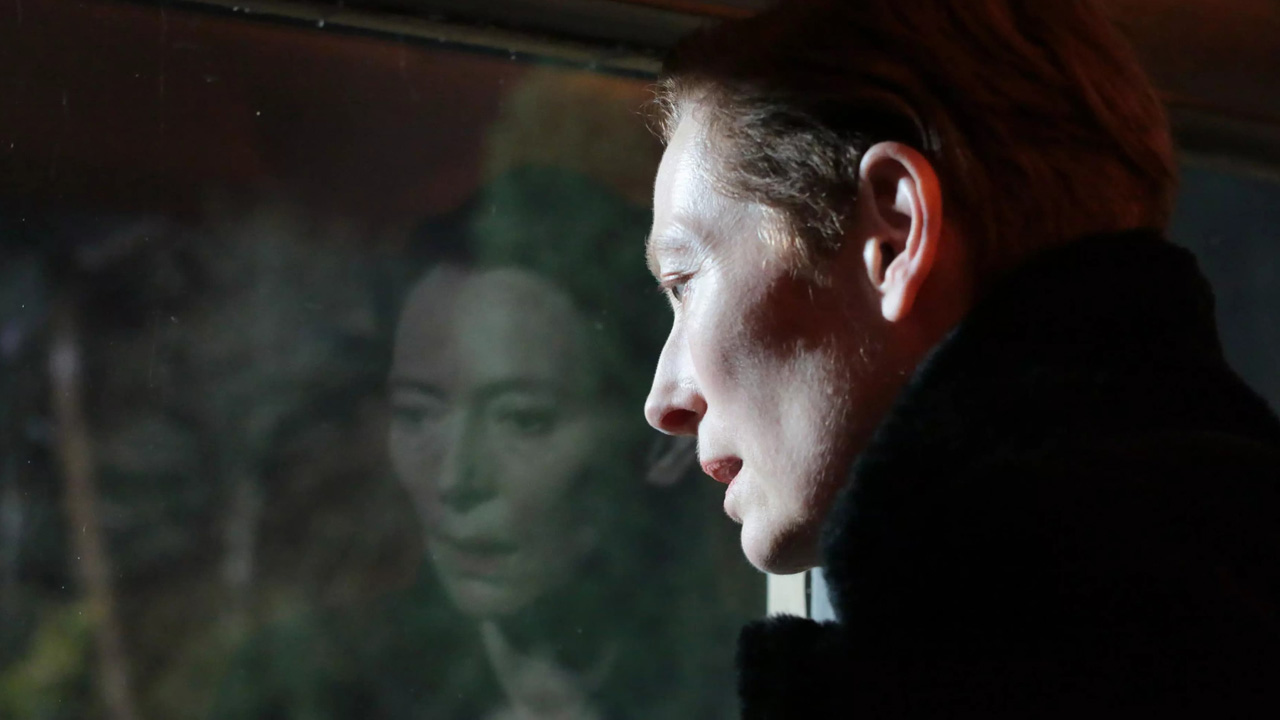
The Eternal Daughter
Wednesday October 5 – Rory Doherty
Here’s to 10 days of 6am alarms! Today kicked off with the world premiere of Roald Dahl’s Matilda: The Musical which hoped to distinguish itself from the other Matilda adaptations by adding as many words to its title as possible. I’m a huge fan of Tim Minchin’s stage musical from which this film is adapted, so I got a lot out of its peppy, fizzy spin on Matilda Wormwood’s chaotic life. Musicals suffer from an unwarranted sense of bloatedness (even when adapted into films), but it’s tough to deny the winningness of the cast and songs.
Next up was Joanna Hogg’s tangential follow-up to The Souvenir diptych–The Eternal Daughter. Links to the double-part bildungsroman are paradoxically vague but clear; but they never get in the way of a good old-fashioned ghost story, 1980s BBC made-for-TV style. Tilda Swinton’s dual performance as mother and daughter are highlights here, as are quiet conversations that manage to completely level you. Too slow for many, but beautiful for me.
Everybody loves Vicky Krieps. Since Paul Thomas Anderson’s powerhouse, sickly rom-com Phantom Thread, every subsequent appearance onscreen has elicited warmth from audiences; but not since 2017 has she shone so brightly in a leading role as in Corsage. Appearing as an Austrian empress during a period in late-19th century European history where, err, things weren’t looking too good for royals, Corsage wears its anachronisms on its sleeve to weave a story of unrest and alienation in a sparky, melancholic fashion. Structurally, it feels a little unwieldy, but every time French singer/songwriter Camille kicks in on the soundtrack, it’s hard to deny the film’s hypnotic power.
Wednesday October 5 – Fatima Sheriff
Roald Dahl’s Matilda: The Musical may not have been my jam: it felt Paddingtonian without that film’s more universal appeal, very childlike but with charming choreography. Bruce Bogtrotter’s a rock star actually. Whether it was worth the 6am start for me is another question, but certainly a cheery way to start the festival! The Eternal Daughter or [redacted Lynne Ramsay movie title] nearly sent me to sleep with its foggy darkness and comfy looking beds but Vicky Krieps’ mysterious performance as the unpredictable Empress in Corsage brought me back up. I look forward to unpacking that story later…
Good Animal count: 5 – Louis (played by Louis) in The Eternal Daughter and the 4 very sleek dogs that accompany the Empress in Corsage.
Tuesday October 4
As we count down to the festival getting underway, our critics in attendance have somehow managed to boil their most-anticipated films down to just five each.
Lillian Crawford
The Eternal Daughter
All the Beauty and the Bloodshed
Women Talking
One Fine Morning (Un Beau Matin)
Creature
Rory Doherty
The Banshees of Inisherin
Bones and All
Women Talking
All the Beauty and the Bloodshed
Guillermo Del Toro’s Pinocchio
Fatima Sheriff
Living
Saint Omer
Glass Onion
Decision to Leave
My Father’s Dragon
Katie Smith-Wong
She Said
White Noise
Women Talking
Unicorn Wars
Glass Onion

